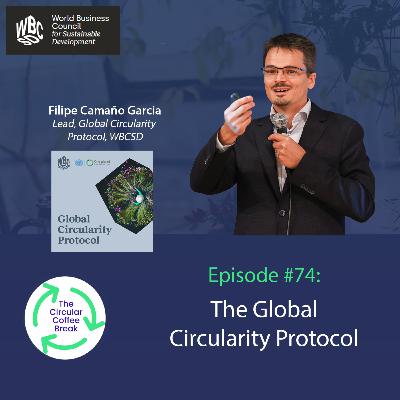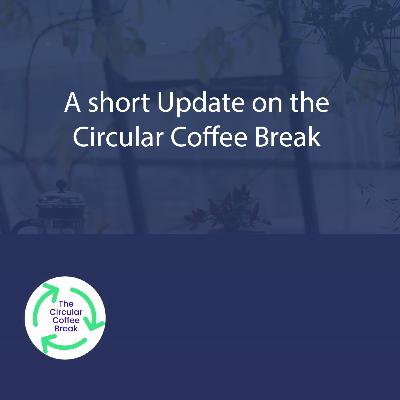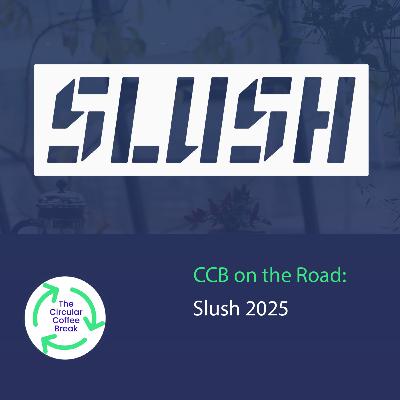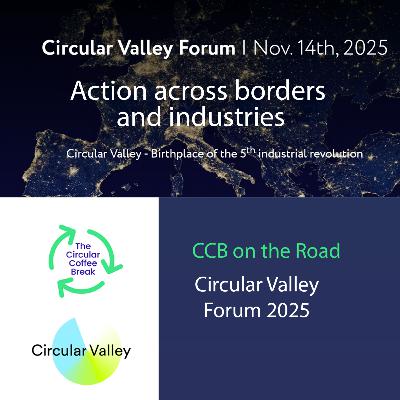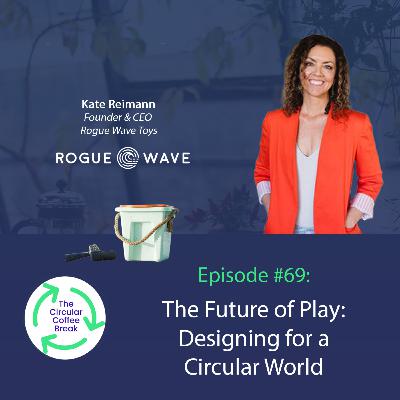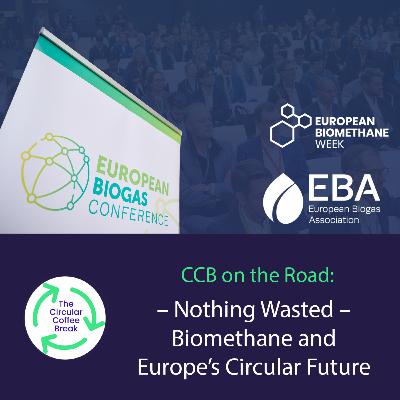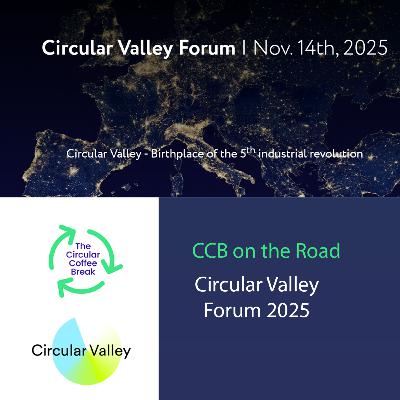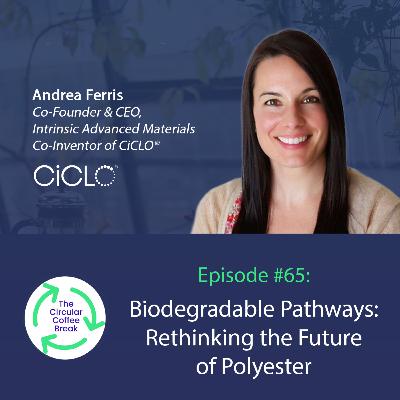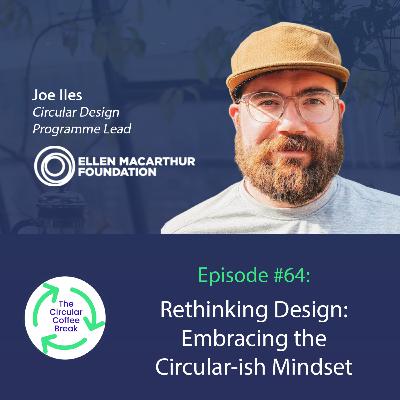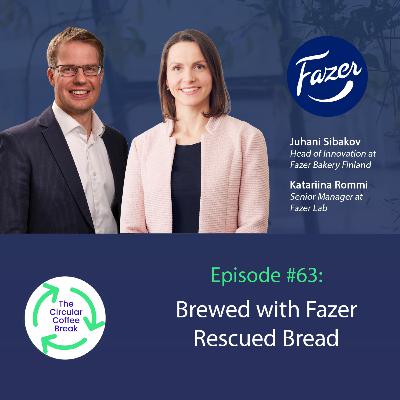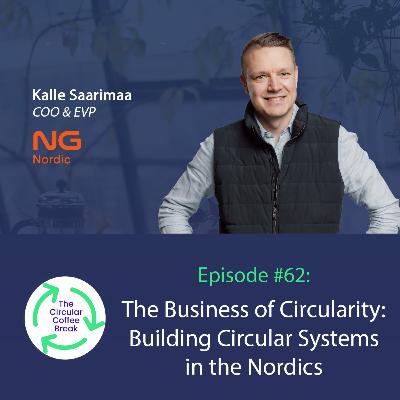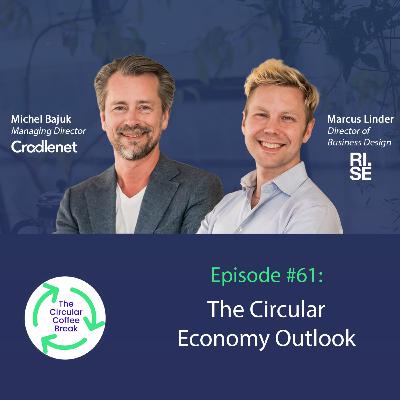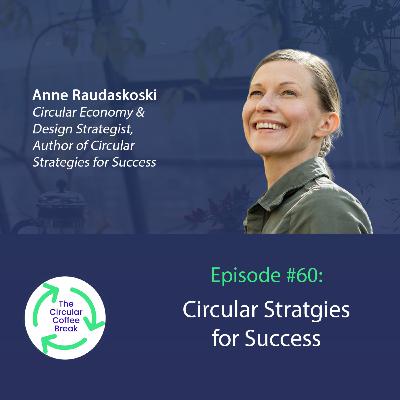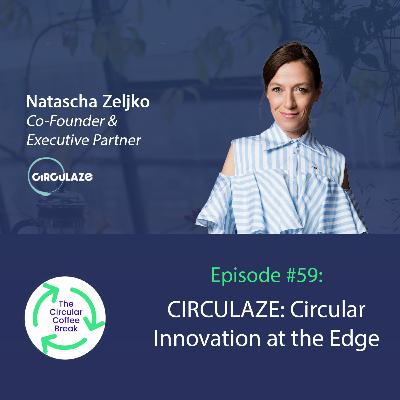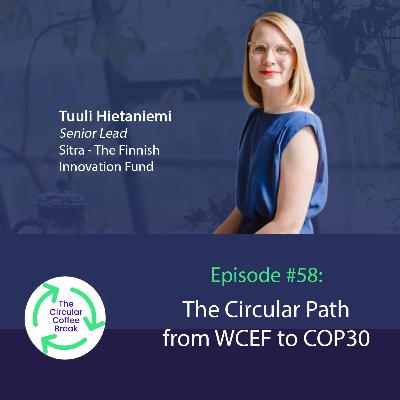Discover The Circular Coffee Break
The Circular Coffee Break

The Circular Coffee Break
Author: Podcast with Michael Hanf
Subscribed: 1Played: 7Subscribe
Share
© Podcast with Michael Hanf
Description
The Circular Coffee Break dives into the world of sustainability and circular economy with thought leaders, innovators, and changemakers. Hosted by Michael, each episode unpacks real-world challenges, breakthrough solutions, and inspiring stories from diverse industries. From cutting-edge innovations to practical advice, this podcast offers fresh perspectives to spark ideas and drive action toward a circular future. Tune in biweekly for engaging conversations and insights that matter.
Hosted on Acast. See acast.com/privacy for more information.
87 Episodes
Reverse
Circular economy has been discussed for more than a decade, yet for most companies it remains fragmented, difficult to scale, and hard to explain to investors and decision-makers. While pilots and innovations abound, the lack of a shared framework has made it challenging to turn circular ambition into business strategy.In this episode of Circular Coffee Break, host Michael Hanf sits down with Filipe Camaño Garcia, Lead, Global Circularity Protocol at the World Business Council for Sustainable Development. Filipe has spent more than a decade working across supply chains, humanitarian operations, policy, and sustainability transformations, and now leads one of the most ambitious global efforts to standardize how businesses approach circularity.The conversation explores why circular economy urgently needs a common language and governance model, similar to what the Greenhouse Gas Protocol created for climate accounting. Filipe explains how the Global Circularity Protocol was developed through a two-year multistakeholder process involving more than 80 organizations, including global companies, governments, development banks, scientists, and civil society actors from both the Global North and the Global South.Michael and Filipe discuss what the protocol actually does in practice. Rather than focusing on abstract principles, the Global Circularity Protocol provides a step-by-step framework to help companies measure, manage, and communicate their circular performance based on real material flows. The discussion highlights how circularity can be embedded into corporate strategy, risk management, and capital allocation, rather than remaining a sustainability side project.A key theme of the episode is the reframing of circular economy as an economic and resilience agenda. Filipe shares insights on supply chain de-risking, resource volatility, and why circular strategies are becoming essential for long-term competitiveness. The conversation also reflects on the role of global policy moments such as COP, where circularity is beginning to gain recognition as a strategic lever for development, not just a waste or recycling issue.The episode goes beyond frameworks and metrics, touching on leadership, systems thinking, and the importance of inclusivity. Filipe explains why the protocol was designed from the outset as a global tool, incorporating perspectives from emerging economies and regions where circular practices already exist but are often undervalued or informal.This conversation is for sustainability leaders, strategy professionals, board members, and anyone working to translate circular economy from concept to action. It offers a grounded, pragmatic look at what it takes to scale circularity in real business environments, and why the next decade will be decisive for how companies value and manage resources. Hosted on Acast. See acast.com/privacy for more information.
This short episode shares an update on the future of The Circular Coffee Break.Host Michael Hanf explains the decision to bring the podcast to a close in February 2026, what listeners can expect from the remaining episodes, and what will happen to the existing archive. Hosted on Acast. See acast.com/privacy for more information.
In this Christmas special of the Circular Coffee Break, Michael Hanf explores what the holiday season looks like through the lens of circularity. From gift wrapping and waste, to circular design and community traditions, the episode reflects on how small, thoughtful choices can reduce pressure and add meaning to Christmas.Featuring short perspectives from TOMRA, Circular&Co, and WWF Germany, this episode shows how circular practices often emerge naturally during the holidays, not out of obligation, but from a desire for simplicity, connection, and care.Wishing you a thoughtful and circular Christmas. Hosted on Acast. See acast.com/privacy for more information.
In this episode of the Circular Coffee Break, Michael Hanf speaks with Costas Papaikonomou, co-founder of Una Terra, a 200-million-euro early growth venture capital fund investing in solutions that accelerate the shift to a more circular and regenerative economy. Costas brings more than twenty-five years of experience in engineering, manufacturing, innovation consulting, and entrepreneurship. He has helped global consumer goods companies turn creative thinking into real products that work at scale. Today he applies the same hands-on mindset to impact investing.The conversation explores what it truly takes to finance the transition to a circular world. Costas explains why circular innovation is still grounded in the physical realities of making things and why the fundamentals of commercial adoption determine whether impact can grow. He outlines why desirability always comes before impact and why technologies must fit into existing manufacturing systems if they are going to scale. A good idea is not enough. It must be something that large companies can buy, produce, and integrate with as little disruption as possible.Michael and Costas dive into the long sales and adoption cycles that challenge early stage circular ventures. They discuss why many startups struggle to cross the gap between promising technology and successful industrial integration, and how investors can support them in staying flexible, reducing unnecessary capital expenditure, and using existing manufacturing capacity instead of building from scratch.A key theme is the critical role of technical sales and customer fit. Costas shares how circular startups often underestimate the number of stakeholders involved in making a material or product switch inside a large organization. Success requires engaging procurement, R&D, product design, logistics, and innovation teams. It also requires being able to tell the difference between customers who are serious about adopting a solution and those who are engaged in what he calls pilot washing. He explains how simple signals can help startups protect their time and focus their efforts on real opportunities.Looking ahead, Costas sees strong momentum for circular investment. Environmental pressure, new regulation, concerns around human health, and the need for supply chain resilience are creating a perfect storm that will push industries to rethink how materials are produced, used, and reused. He argues that circularity is not only an environmental requirement. It is also a strategic and commercial one that will shape Europe’s competitiveness in the decades to come.The episode closes with an optimistic but grounded reflection. The circular transition is a century scale journey. It requires investors and innovators who understand the realities of physical products, industrial systems, and commercial adoption. Una Terra aims to be part of this shift by backing companies that combine strong impact potential with practical pathways to market.Tune in to learn how capital can become a catalyst for systemic change, what it takes to scale circular solutions, and how the next generation of ventures can reshape the material basis of our economy. Hosted on Acast. See acast.com/privacy for more information.
In this special Circular Coffee Break episode recorded live at Slush 2025 in Helsinki, host Michael Hanf explores how circular innovation is moving from vision to implementation across Europe. While circularity was not a headline theme this year, it was noticeably more present, reflected in the founders shaping new solutions in energy storage, materials, electronics, chemistry, agriculture, and even space.Across seven conversations, listeners hear directly from the innovators building practical, scalable circular models. From second-life batteries and plastic-free hemp materials to circular smartphones, regenerative filters made from human hair, bio-based polyols, recyclable paper coatings, and responsible satellite end-of-life systems, each founder shares how circularity is becoming an operational advantage, not an afterthought.If you want a concise, real-world snapshot of where circular innovation stands today, this episode offers a grounded look at the ideas gaining momentum and reshaping industries. Hosted on Acast. See acast.com/privacy for more information.
Circularity is accelerating, and the 2025 Circular Valley Forum in Wuppertal offered a vivid snapshot of how fast the transition is unfolding. The event brought together leaders from industry, science, public institutions, startups and civil society. The atmosphere was buzzing with energy, ideas and a shared determination to turn circular concepts into real action.In this special episode of the Circular Coffee Break Podcast, we bring together conversations from across the Forum to explore what circularity looks like in practice today. Each voice offers a different window into the transition, and together they reveal how interconnected and dynamic this field has become.We begin with Tim Janßen of the Cradle to Cradle NGO, who reflects on how circularity has evolved over the past decade and why the social and ecological foundations of the movement matter more than ever.From there we turn to science and applied research with Prof. Dr. Manfred Renner of Fraunhofer UMSICHT, who discusses how breakthrough technologies move from lab to real-world implementation.The industry perspective comes from Rolf Bayersdörfer of Henkel Consumer Brands, Adrian Blum of Evonik, and Björn Hoffmann of BASF. They explore how large companies navigate complex supply chains, develop circular raw materials, scale circular business models and build partnerships that make change possible.We then move into systems thinking with Inge Neven, CEO of VITO, who explains how real scale demonstrators and mini factories help bridge the gap between research and industry.Steffen Knodt, representing the German Aerospace Centre and the UN Ocean Decade, expands the conversation to ocean health and global material flows, showing how circularity and planetary boundaries are closely linked.Several startup founders share how circularity is becoming an engine of innovation. Marc Diefenbach of rhinopaq introduces reusable solutions for B2B packaging. Felix May of recarbished explains how new ownership models can secure valuable materials at the end of vehicle lifecycles. Peter Johnson of LightEd offers a powerful story about turning waste into solar solutions for off-grid communities in Nigeria and Rwanda, highlighting the social dimension of circularity.We close with a cultural perspective from Carsten Cramer of Borussia Dortmund, who reflects on how football can make sustainability and circularity accessible to millions of fans.Across all conversations, a few themes stand out. Circularity is no longer a concept. It is becoming a strategic necessity across industries. Progress depends on collaboration across borders and systems. Innovation must be demonstrated at scale, not only discussed in theory. And culture, storytelling and public engagement are essential for driving societal adoption.This episode offers a panoramic view of circularity at a moment of real momentum. It highlights the people, ideas and partnerships pushing the movement forward and invites listeners to reflect on what it will take to accelerate the transition even further.Listen in and join the conversation. Hosted on Acast. See acast.com/privacy for more information.
In this episode of The Circular Coffee Break, host Michael Hanf speaks with Kate Reimann, Founder and CEO of Rogue Wave Toys, about how a single day at the beach led to a breakthrough in sustainable design.When a wave swept her children’s plastic toys out to sea, Kate decided to rethink what play could look like in a world drowning in plastic. The result was Rogue Wave Toys, a company creating durable, compostable beach toys made from biopolymers, plastics made from plants instead of petroleum.Together, Michael and Kate discuss: 🔸 The long road from an idea to a viable circular product 🔸 How compostable biopolymers work and why they matter 🔸 The hidden challenges of consumer education and pricing in sustainability 🔸 The importance of storytelling and authenticity in building awareness 🔸 How circular design can reshape industries far beyond toysKate also shares lessons learned from building a mission-driven company, the importance of persistence, and her vision for scaling sustainable materials across industries, from beach toys to everyday products.As she puts it, “If we want a different future, we have to be brave enough to build it — even if that starts with something as small as a beach toy.”🎧 Listen to The Future of Play: Designing for a Circular World Hosted on Acast. See acast.com/privacy for more information.
In this episode of The Circular Coffee Break, host Michael Hanf sits down with Allison Jordan, Executive Director of the California Sustainable Winegrowing Alliance (CSWA) and Vice President of Environmental Affairs at the Wine Institute.For more than two decades, Allison has helped turn California into a global model for sustainable winegrowing. Today, over 2,600 vineyards and wineries, representing more than 90 percent of the state’s wine production, are certified sustainable. But behind those numbers lies a story about collaboration, resilience, and rethinking how a centuries-old industry can thrive in a changing world.Together, Michael and Allison explore what it takes to make sustainability work from grapes to glass, and why wine is a powerful lens for understanding the balance between environmental, social, and economic success.Tune in to learn about:How the California wine industry built one of the world’s leading sustainability programsThe challenges and trade-offs wineries face in balancing profit, people, and planetHow climate change is transforming vineyards and shaping new farming practicesThe growing importance of global standards and certification in wine exportsWhy “regenerative” isn’t a trend but an evolution of sustainable practicesHow digital tools and transparency are changing how wineries communicate with consumersFrom droughts and wildfires to shifting consumer expectations, California’s wine industry is confronting the realities of climate change head-on. The CSWA’s Climate Action Toolkit now helps vineyards measure and reduce emissions, adapt to extreme weather, and find win-win solutions that protect both business and biodiversity.Allison also shares insights from her experience as a restaurant owner, offering a practical perspective on sustainability from the other side of the wine glass. Her message is clear: whether you are a grower, a producer, or a consumer, sustainability is a shared journey that depends on collaboration, innovation, and long-term thinking.As she puts it, “Sustainability in wine is about much more than protecting the environment. It’s about producing high-quality wine, enriching the lives of employees and neighbors, and safeguarding family farms and vibrant businesses for generations to come.”Join the conversation to discover how California is cultivating the future of sustainable wine and what the rest of the world can learn from its success. Hosted on Acast. See acast.com/privacy for more information.
Recorded live at the European Biogas Conference during European Biomethane Week 2025, this special episode of The Circular Coffee Break explores how biogas and biomethane are driving Europe’s transition to a truly circular economy.Biomethane connects energy, waste management, and nutrient recovery — turning residues into clean energy and valuable resources. In this episode, policymakers, researchers, financiers, and innovators share how Europe can scale biomethane to strengthen competitiveness, resilience, and climate neutrality.Featuring insights from:Daniel Mes (European Commission) on how biomethane fits into Europe’s competitiveness and clean industrial strategy.Mats Eklund (Linköping University) on the science of circular systems and industrial symbiosis.Oriol Bellot Miana (European Investment Bank) on the role of finance as an enabler of circular infrastructure.Simon Ford (Celtic Bioenergy) on expanding the feedstock base with advanced pre-treatment technologies.Mia Shaw (RAFT Energy / Real Zero) on maximizing efficiency and accelerating the energy transition.Louise Parlons Bentata (Bluemethane) on capturing residual methane and closing the final loop.Piero Gattoni (Consorzio Italiano Biogas / European Biogas Association) on circularity in agriculture and Italy’s leadership in biomethane production.Together, their stories show how biomethane is not just another renewable fuel, but a circular connector — linking energy, waste, and nutrient recovery in a single, regenerative system. From expanding feedstocks to optimizing processes and recovering every last molecule of methane, the sector is redefining what sustainable growth can look like.🎧 Tune in to learn how biomethane is helping Europe accelerate its transition to a circular economy, where nothing is wasted and everything has value. Hosted on Acast. See acast.com/privacy for more information.
What does it take to design products that turn today’s waste into tomorrow’s resource? In this episode of the Circular Coffee Break, host Michael Hanf sits down with Dan Dicker, Founder and CEO of Circular&Co., to explore how circular design principles can move from idea to practice.Dan began his career as a designer at Dyson, where he experienced the thrill of blue sky innovation. Yet when he proposed using recycled materials, the idea was dismissed as impractical due to cost and supply chain risks. That rejection inspired him to start his own company in Cornwall, with a clear mission: create products made from waste, built to last, and fully recyclable at the end of life.Over the past two decades, Circular&Co. has grown into a global partner for companies and brands, helping them design and scale circular products. In the conversation, Dan shares lessons learned from that journey:Why circular design means looking beyond the product to redesign supply chains and logistics.How to work with big brands by creating “win-win” solutions that fit existing operations.The importance of choosing the right battles, picking materials and products that can be circular without needing to change customer habits.Why consumer behaviour should not be the starting point. Circular products need to be the default so that adoption happens naturally.The value of clear design rules. Circular&Co. follows a “100, 10, 100” principle: 100 percent recycled content, minimum 10-year lifespan, and 100 percent recyclability.Dan also highlights new business models that could shift markets. One is Tap and Reuse, a system piloted with Waitrose where customers borrow a reusable cup with a simple card tap, returning it within days at no cost. Another is product as a service, where durable goods like washing machines are leased rather than sold, aligning manufacturer incentives with longevity and repairability.The episode also explores how Circular&Co.’s Cornish roots shaped its ethos. Being based in a coastal community brought the team closer to nature and sustainability, while proximity to Exeter University’s Centre for the Circular Economy provided vital research partnerships.For companies starting out, Dan offers practical advice. Set clear design pillars from the beginning. Work only with suppliers willing to innovate. Insist on better, even when it is hard. And above all, maintain a can do mindset. Circularity will not always be easy, but the rewards in resilience and competitive advantage are significant.As Dan puts it, “The pace is frustrating, but it will happen. Our job is to push the snowball down the hill. Over time, momentum is unstoppable.”This conversation is not only a story of one entrepreneur’s persistence, but also a guide for leaders who want to embed circularity into their own businesses. Whether you are designing products, shaping supply chains, or setting strategy, the lessons from Circular&Co. show how turning waste into value is not only possible, but essential. Hosted on Acast. See acast.com/privacy for more information.
For this special CCB on the Road edition, the Circular Coffee Break team packed the microphones and joined Impact Day 2025 in Tallinn — Northern Europe’s largest sustainability and impact event.Across two days of lively discussions, we sat down with innovators, policy leaders, and changemakers who are redefining how circularity, finance, and leadership come together to build a more sustainable world.Each conversation explores a simple but powerful question:👉 How do we turn impact into action?From the trading floors of Nasdaq to regenerative farms, from MIT labs to hotel kitchens, our guests share stories of ambition, experimentation, and purpose, all showing that circularity isn’t a department or a buzzword, but a mindset that connects everything we do.In this Impact Day 2025 special, you’ll hear from:Monika Tamošiūnaitė – Nasdaq → On how financial disclosure and transparency can spark real-world change.Andrus Treier – Environmental Investment Centre (KIK) → On why small, local projects can add up to massive systemic impact.Christopher Flensborg – SEB → On reimagining water as an economic asset and key sustainability lens.Dr. Gregory Norris – MIT / SHINE Initiative → On “handprints” — the positive impacts that multiply when we act.Frank Muro – Environmental Impacts Academy → On building the mindset and skills to move from intention to implementation.Kaisa Sibelius – Forum Virium Helsinki → On designing circular tools that keep creating value even after projects end.Madis Laid – Duco Hotels → On redefining “luxury” and tackling waste in the hospitality industry.Miglė Makuškaitė-Survilė – Planet Positive → On engaging employees to make sustainability part of everyday culture.Salla Sulasuo – Paulig Group → On embedding sustainability into corporate DNA — from sourcing to innovation.Together, these conversations paint a vivid picture of where circularity is heading — beyond frameworks and KPIs, into real transformation across sectors and generations.☕ Whether you work in business, policy, education, or activism, this episode offers an inspiring glimpse into how people across Europe and beyond are putting impact at the center of their decisions.🎙️ Circular Coffee Break – On the Road at Impact Day 2025Because the most powerful ideas often start over a cup of coffee. Hosted on Acast. See acast.com/privacy for more information.
The CCB Podcast is partnering with the Circular Valley Forum 2025, which takes place on November 14th in Wuppertal under the theme “Partnerships for a Circular Economy.”In this teaser, Michael speaks with Carsten Gerhardt, founder of Circular Valley and Chairman of the Circular Valley Foundation. He shares what makes the Forum a unique platform for collaboration and what participants can look forward to at this year’s event.Tune in for a first glimpse of the conversations and insights that will shape our special live episode from the Forum. Hosted on Acast. See acast.com/privacy for more information.
Polyester and nylon dominate the textile industry because they are affordable, durable, and versatile. But these same materials are also among the leading sources of microplastic pollution worldwide, from the clothes we wear to the carpets beneath our feet. Addressing this challenge is complex, but innovation is beginning to provide new answers.In this episode of The Circular Coffee Break, host Michael Hanf is joined by Andrea Ferris, Co-Founder and CEO of Intrinsic Advanced Materials and co-inventor of a breakthrough technology designed to embed biodegradable pathways into synthetic fibers. The result: textiles that retain the strength and performance of polyester while reducing their long-term environmental impact.Andrea shares her journey from managing uniform programs for McDonald’s to spearheading textile innovation with global brands. What started as a practical need to “make a better polyester” has evolved into a technology now available in 18 countries and used by retailers such as Walmart, Target, and Hanes.The conversation explores: 🔹 The scale of microfiber pollution and why synthetics are unlikely to disappear anytime soon 🔹 How biodegradable pathways work at the polymer level to reduce microplastic pollution 🔹 The importance of creating a drop-in solution that doesn’t change consumer behavior 🔹 Lessons learned from scaling new materials across global supply chains 🔹 How brands, regulators, and consumers are shaping the pace of adoption 🔹 Why affordability and infrastructure are critical to mainstreaming sustainable fibers 🔹 The role of champions inside companies who push innovation forward 🔹 The growing consumer awareness of microplastics and their health impactsAndrea emphasizes that incremental change matters. While some argue for eliminating synthetics entirely, the reality is that 70 million metric tons of polyester are produced annually, projected to reach 90 million by 2030. Realistic, scalable solutions that work with existing systems are essential.She also points to rising consumer awareness: studies show microplastics are found in seafood and even in human bodies, with textile fibers making up a majority of the fragments detected. Public concern is pushing industry and regulators to act faster, creating both challenges and opportunities for innovators.For entrepreneurs, Andrea’s advice is clear: start by solving the problems closest to you. Her own trigger moment came during a corporate sustainability webcast that asked suppliers to rethink their greatest impact. By focusing on the uniform program she was responsible for, she was able to identify a tangible problem and create a scalable solution.Looking ahead, Andrea envisions a textile industry that within 10–15 years has true circular systems in place, with more sustainable fibers, PFAS eliminated, and recycling embedded at scale. To get there, she believes industry must take the lead: “They can, they should, and they are.”This episode offers an unfiltered look at the challenges of scaling innovation in one of the world’s most entrenched industries and the promise of technologies that turn today’s problems into tomorrow’s solutions.🎧 Listen in to learn how biodegradable pathways could help tackle microfiber pollution and why pragmatic, step-by-step innovation is the way forward. Hosted on Acast. See acast.com/privacy for more information.
What does it really take to design for circularity? And how do we balance ambition with the messy realities of business and innovation?In this episode of The Circular Coffee Break, host Michael Hanf sits down with Joe Iles, Circular Design Programme Lead at the Ellen MacArthur Foundation, to explore the evolving role of design in driving the transition towards a circular economy. Joe has been with the Foundation since 2011 and has become one of the most recognized voices in circular design, working with companies, designers, and innovators around the world.Together, they discuss:☕ The evolution of circular design – how it has shifted from a standalone concept to an embedded part of mainstream innovation.☕ The idea of “circular-ish” – why embracing imperfection and iteration is essential for progress.☕ Six key entry points for businesses – practical ways companies can engage their design and innovation teams to accelerate circularity.☕ Case examples – including Decathlon’s approach to combining repair, resale, and rental models to create a “minimum viable ecosystem.”☕ The bigger picture – how circularity is not just about sustainability, but also about competitiveness, resilience, and future prosperity.☕ A challenge to designers and innovators – are you empowered to take bold steps towards circularity in your organization?Joe emphasizes that circularity is not about perfection but about momentum. Small steps, when connected, can trigger systemic change. He also highlights the importance of transparency and bringing customers along on the journey, even when progress is incremental.This conversation is packed with insights for business leaders, designers, innovators, and policymakers who are grappling with how to move from ambition to action. It’s a reminder that circular design is both a mindset and a practice and that the transition will require courage, creativity, and collaboration at every level.🎧 Listen in to discover how to embrace “circular-ish” thinking, empower creative teams, and turn design into a catalyst for real change in the economy. Hosted on Acast. See acast.com/privacy for more information.
What happens when a 130-year-old food company decides to turn its waste into value? In this episode of The Circular Coffee Break, we sit down with Juhani Sibakov, Head of Innovation at Fazer Bakery Finland, and Katariina Rommi, Senior Manager at Fazer Lab, to uncover how Fazer is reimagining food waste—and turning surplus bread into a circular innovation success story.At the heart of the discussion is Fazer’s latest creation: Brewed with Fazer Rescued Bread, a new craft beer developed in collaboration with Teerenpeli Brewery & Distillery. The twist? It’s made using surplus rye bread from Fazer’s own bakeries, replacing up to 25% of the traditional malt. What started as an idea nearly a decade ago has now become a shelf-ready product available in supermarkets across Finland.We unpack how this venture fits into Fazer’s ambitious goal to cut food waste by 50% by 2030, and explore the technical, cultural, and commercial ingredients that made it possible. From stabilizing fluctuating side streams to crafting a consumer-friendly narrative, the team shares how they turned a sustainability challenge into an innovation opportunity.Katariina walks us through Fazer Ventures—an internal startup model that empowers employees to act like entrepreneurs and test ideas fast. Whether it’s oat-based frozen treats or beer from bakery leftovers, these internal ventures are helping Fazer build new value chains and shift from waste to worth.Key topics we cover in this episode:The story behind Brewed with Fazer Rescued BreadTechnical challenges and how the team overcame themHow upcycled ingredients can be made drop-in ready for partnersThe power of cross-functional teams and agile experimentationChanging consumer perceptions around surplus-based productsWhat makes a circular collaboration succeed across industriesWhy internal venturing is key for scaling sustainabilityFuture circular product ideas from chocolate, candy, and moreJuhani and Katariina also reflect on how the retail landscape is evolving, with major Finnish retailers now actively seeking products made from surplus ingredients and how consumer attitudes toward circularity are maturing beyond price sensitivity. Hosted on Acast. See acast.com/privacy for more information.
What does it take to move circular economy from concept to commercial reality?In this episode of The Circular Coffee Break, host Michael Hanf sits down with Kalle Saarimaa, Chief Operating Officer and Executive Vice President at NG Nordic, to explore how circularity is being scaled across industrial and municipal systems. With decades of experience across the Nordic waste, recycling, and circular solutions space, including senior roles at Fortum and Ekokem, Kalle offers one of the most grounded, strategic perspectives on how to operationalize circularity at scale.As COO of one of the largest waste and recycling companies in the Nordic region, Kalle oversees NG Nordic’s Industrial Waste Services Division, Group Procurement, Innovation, and Operational Excellence. He is also a board member at several recycling and technology companies and an active voice in shaping Europe’s circular policy and business landscape.🎧 What we cover in this episode:🔹 How Kalle’s thinking on circular economy has evolved over time 🔹 Why recycling alone won’t solve the circularity challenge 🔹 The five-stage framework for bringing innovation to scale 🔹 The barriers to, and opportunities in urban reuse and circular construction 🔹 NG Nordic’s role as an enabler across value chains and sectors 🔹 How regulation can either accelerate or stall circular business models 🔹 The critical role of depollution and chemical safety in circular systems 🔹 The future of secondary materials and why we must price in environmental externalities 🔹 Geopolitical risks, resource scarcity, and the case for resilient circular supply chains 🔹 What gives Kalle optimism and what keeps him up at nightThis episode dives deep into the operational, technological, and systemic realities of circularity. From scaling innovation and managing hazardous materials to enabling policy and cross-sector collaboration, Kalle presents a compelling case for infrastructure-level transformation.Circularity is not just about technology or recycling, it’s about rethinking systems, shifting regulation, and rebuilding trust in the material loops that sustain modern life. And companies like NG Nordic are at the heart of that shift. Hosted on Acast. See acast.com/privacy for more information.
How far have Nordic companies really come on their circular journey?In this episode, Michel Bajuk (Cradlenet, Nordic Circular Hotspot) and Marcus Linder (RISE) unpack key insights from the Nordic Circular Economy Outlook 2024. From strategy gaps to measurable impact, we explore the first data-driven snapshot of how publicly listed Nordic firms are progressing on circularity and where they need to go next. Hosted on Acast. See acast.com/privacy for more information.
Anne Raudaskoski, co-founder of circular design consultancy Ethica and author of Circular Strategies for Success, shares how companies can embed circularity across products, services, and business models. From mindset shifts to design frameworks, this episode offers a hopeful, hands-on guide for driving real impact. Hosted on Acast. See acast.com/privacy for more information.
Natascha Zeljko, Co-founder of CIRCULAZE, shares how her platform is accelerating the circular economy through radical cross-industry collaboration. From spotlighting groundbreaking startups to convening corporates, investors, and universities, Natascha discusses what it takes to drive real transformation and why circularity is key to the future of business. Hosted on Acast. See acast.com/privacy for more information.
What role can circular economy play in global climate action? In this episode, Tuuli Hietaniemi, Senior Lead at SITRA, joins us to discuss key takeaways from the World Circular Economy Forum 2025 and the road to COP30. We explore circularity as a tool for climate implementation, the evolving role of national policies, and how businesses can prepare for what's ahead. Hosted on Acast. See acast.com/privacy for more information.


